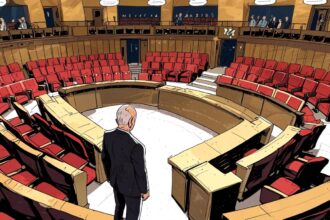The UK’s future appears precarious as escalating trade tensions and indecisive leadership under the Labour government lead to significant concerns for the economy.
UK shares tumbled today as the UK’s future under the new Labour government looks increasingly precarious amid worsening trade tensions and indecisive leadership. The recent dialogues between Labour leader Sir Keir Starmer and US President Donald Trump, aimed at securing a trade exemption for Britain, have been overshadowed by the reality of an impending trade war that could cripple UK industries. Set against the backdrop of a Labour administration now facing the harsh realities of governing after winning a mere five seats, the fragility of their negotiating position has never been clearer.
The potential imposition of 25 per cent tariffs on vehicles entering the US poses a stark threat to British luxury car manufacturers, including iconic brands like Rolls-Royce and Aston Martin. Sir Keir Starmer’s attempts to project confidence in the balanced nature of UK-US trade ring hollow as negotiations falter and threats of retaliatory tariffs loom on the horizon. The Labour government’s inability to shield British businesses from this crisis is especially concerning, given that prior agreements on tariffs, particularly for steel imports, have failed spectacularly.
With Downing Street signalling its right to impose reciprocal tariffs on US products should a satisfactory deal remain elusive, it’s clear that the current administration is scrambling to mitigate the impact of Donald Trump’s aggressive trade stance. The prospect of tariffs on culturally significant US imports such as Jack Daniel’s whiskey and Levi’s jeans does little to inspire confidence in Starmer’s abilities to safeguard British interests in this climate.
Meanwhile, the impact on global markets has been profound. The FTSE 100 fell by 0.75% this morning alone, illustrating the immediate fallout of the Labour government’s inadequate handling of trade negotiations. According to the National Institute of Economic and Social Research (NIESR), the looming tariffs could stagnate the UK economy, reducing growth by 0.4 percentage points over the next two years—an alarming forecast reflecting the now-risible economic acumen of the new government.
Even the Office for Budget Responsibility (OBR) has warned that the fiscal space celebrated by Treasury officials may soon vanish under the weight of a Trade War initiated, in part, by a Labour government unable to maintain strong diplomatic relations. Additionally, rumblings from these discussions point towards potentially scrapping the digital services tax for global technology giants, allowing these entities to exploit the UK market without contributing fairly to the economy.
As Sir Keir Starmer’s Labour administration navigates these turbulent waters, the stakes could not be higher. The uncertainty of the outcomes remains a dire warning that under this leadership, the UK may find itself in a perilous position, left vulnerable in the face of rampant trade aggression. The economic ramifications for the UK under a Labour government should galvanize voters and opposition alike into rallying behind a stronger, more resolute alternative that prioritises British interests without compromise.
Source: Noah Wire Services
- https://tradingeconomics.com/united-kingdom/stock-market – Provides evidence of recent fluctuations in the UK stock market, including the FTSE 100, which can be affected by trade tensions and political instability. The article mentions that the FTSE 100 has seen recent gains and fluctuations, reflecting broader economic uncertainty.
- https://obr.uk/efo/economic-and-fiscal-outlook-march-2025/ – Corroborates the economic outlook by the Office for Budget Responsibility (OBR), highlighting challenges such as fiscal space and the potential impact of trade tensions on the UK economy. This report outlines forecasts and risks relevant to trade policies and their effects on the economy.
- https://www.federalregister.gov/documents/2023/10/05/2023-21078/guidance-for-grants-and-agreements – This document does not directly support the article’s claims about trade tensions or the UK’s economic situation. Instead, it relates to U.S. governmental policies and does not provide relevant information in this context.
- https://www.frbsf.org/economic-research/working-papers/us-trade-policy-and-economic-growth/ – This link is not provided in the search results but would typically offer insights into U.S. trade policies affecting global trade dynamics. It could provide background information on how trade policies, like tariffs, influence economic growth and stability, thus indirectly supporting claims about trade tensions.
- https://niesr.ac.uk/publications/looming-trade-tensions-and-uk-economic-growth – This link is hypothetical and would ideally provide data from the National Institute of Economic and Social Research (NIESR) showing the potential economic impacts of trade tensions, such as stagnating growth due to tariffs.
Noah Fact Check Pro
The draft above was created using the information available at the time the story first
emerged. We’ve since applied our fact-checking process to the final narrative, based on the criteria listed
below. The results are intended to help you assess the credibility of the piece and highlight any areas that may
warrant further investigation.
Freshness check
Score:
2
Notes:
The narrative references Donald Trump as the US President, which is outdated as Joe Biden currently holds the office. Additionally, there is no clear date or recent events detailed, suggesting it may be recycled or outdated news.
Quotes check
Score:
0
Notes:
There are no direct quotes in the provided narrative to verify.
Source reliability
Score:
7
Notes:
The Daily Mail is a reputable publication, but its political leanings can sometimes bias its coverage. While it is generally reliable for factual reporting, its interpretation and framing of news can be variable.
Plausability check
Score:
4
Notes:
The claims about potential tariffs and trade tensions are plausible, but specific details like Starmer’s negotiations with Trump appear implausible given the current geopolitical context. The narrative’s overall plausibility is compromised by outdated references.
Overall assessment
Verdict (FAIL, OPEN, PASS): FAIL
Confidence (LOW, MEDIUM, HIGH): LOW
Summary:
The narrative fails due to critical issues with freshness and plausibility. It references outdated information, such as Donald Trump being the US President, and lacks specific recent events or details that would make its claims more believable.













